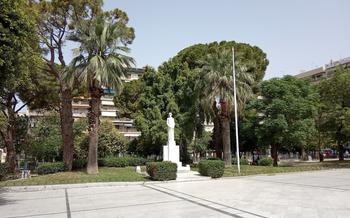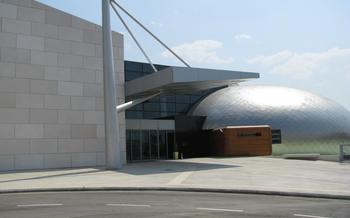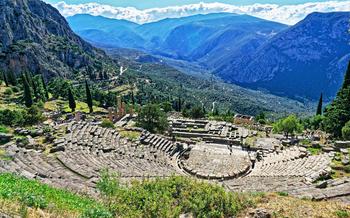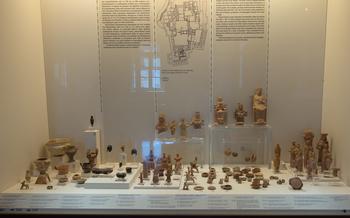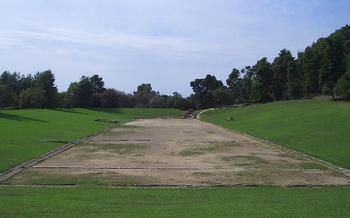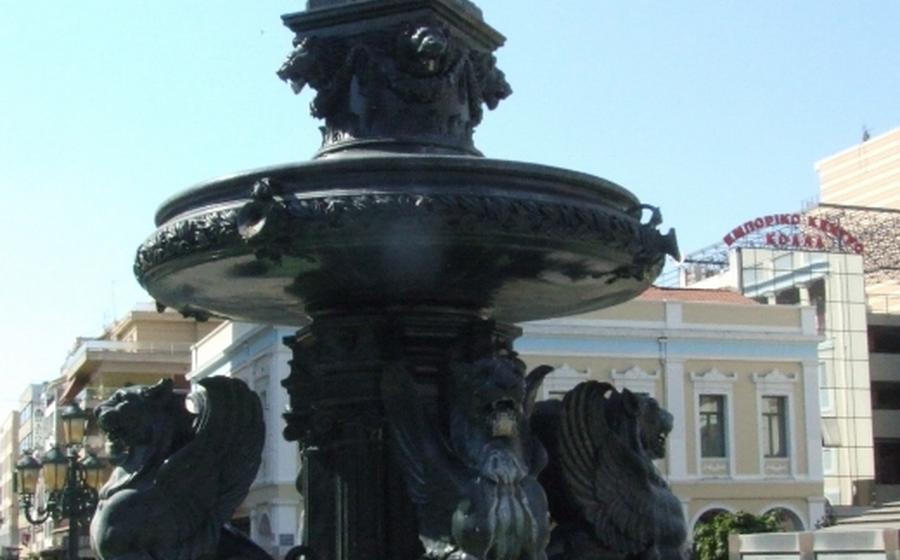
The Folklore Museum of the Peloponnesian Folklore Foundation
- A Journey into Greek Traditions: Exploring the Folklore Museum of the Peloponnesian Folklore Foundation
- Location and Accessibility: Finding the Museum's Doorstep
- Stepping into the Past: A Glimpse into Greek History
- Traditional Craftsmanship: A Celebration of Greek Artisans
- Costumes and Fashion: A Reflection of Greek Identity
- Musical Heritage: The Rhythms of Greek Culture
- Religious Iconography: Exploring Greek Spirituality
- Domestic Life: A Window into Greek Households
- Agriculture and Rural Life: The Heart of Greek Traditions
- Maritime Traditions: Embracing the Seafaring Legacy
- The Role of Women in Greek Society: Honoring the Feminine Spirit
- Temporary Exhibitions: Exploring Special Themes
- Insider Tip: Enhancing Your Visit to the Museum
A Journey into Greek Traditions: Exploring the Folklore Museum of the Peloponnesian Folklore Foundation
The Folklore Museum of the Peloponnesian Folklore Foundation in Patras, Greece, stands as a testament to the rich cultural heritage of the region. Established in 1972, the museum has dedicated itself to preserving and promoting the diverse traditions and customs of the Peloponnese and the broader Greek nation. Through its extensive collection of artifacts, interactive exhibits, and educational programs, the museum offers a captivating journey into the heart of Greek folklore.
History: Unveiling the Museum's Rich Past and Its Dedication to Preserving Greek Cultural Heritage
The Folklore Museum of the Peloponnesian Folklore Foundation was founded by a group of passionate individuals committed to safeguarding the cultural heritage of the Peloponnese. Recognizing the importance of preserving traditional arts, crafts, and customs, they established the museum as a center for research, documentation, and exhibition. Over the years, the museum has grown significantly, expanding its collection and becoming a renowned institution for the study and appreciation of Greek folklore.
Significance: Understanding the Museum's Status as a Renowned Center for Folklore Studies
The Folklore Museum of the Peloponnesian Folklore Foundation has gained prominence as a leading center for folklore studies in Greece. Its extensive collection, coupled with its commitment to research and education, has positioned the museum as a valuable resource for scholars, researchers, and enthusiasts alike. The museum's contributions to the field of folklore have been widely recognized, earning it a reputation as a trusted authority on Greek cultural traditions.
Collection Highlights: Offering a Glimpse into the Museum's Vast Array of Artifacts
The museum houses a vast and diverse collection of artifacts that provide a comprehensive overview of Greek folklore. From traditional costumes and textiles to musical instruments, religious icons, and everyday objects, the museum's collection offers a glimpse into the rich cultural heritage of the Peloponnese and Greece. Visitors can explore exhibits showcasing traditional crafts, such as pottery, weaving, and woodworking, gaining insights into the skill and artistry of Greek artisans.
Practical Information: Providing Essential Details for a Seamless Visit
The Folklore Museum of the Peloponnesian Folklore Foundation is located in the heart of Patras, making it easily accessible to visitors. The museum is open to the public from Tuesday to Sunday, with guided tours available upon request. Admission fees are minimal, ensuring that everyone has the opportunity to experience the museum's treasures. The museum also offers a range of educational programs, workshops, and temporary exhibitions, providing visitors with a comprehensive and engaging experience.
Location and Accessibility: Finding the Museum's Doorstep
The Folklore Museum of the Peloponnesian Folklore Foundation is conveniently located in the heart of the city of Patras, Greece, at 21, Riga Fereou Street. Visitors can easily reach the museum using various modes of transport.
Address:
Folklore Museum of the Peloponnesian Folklore Foundation 21, Riga Fereou Street Patras 262 21, Greece
Transportation Links:
-
By Car: For those arriving by car, street parking is available in the vicinity of the museum.
-
By Public Transport:
- The museum is well-connected by public transportation, with several bus stops within walking distance.
- Visitors can take buses 1, 3, 5, 6, 8, 10, 11, 12, 15, 17, 18, 19, 21, and 99 to reach the museum.
Parking Facilities:
- Street parking is available in the surrounding area, but it can be limited, especially during peak tourist season.
- There are several parking garages and lots within a short walking distance of the museum, offering convenient parking options for visitors.
Accessibility Features:
- The museum is wheelchair accessible, with ramps and elevators providing easy access to all floors.
- The museum also offers accessible restrooms and other facilities for visitors with disabilities.
Stepping into the Past: A Glimpse into Greek History
As you step through the doors of the Folklore Museum of the Peloponnesian Folklore Foundation, you embark on a journey into the captivating history of Greece. The museum's collection of artifacts narrates the story of this ancient land, from its humble beginnings to its rise as a global cultural and intellectual powerhouse.
Historical exhibits showcase a diverse range of objects, from ancient pottery and tools to religious icons and traditional costumes. Each artifact tells a tale of the people who lived in this region, their customs, their beliefs, and their struggles.
Interactive displays bring history to life, allowing visitors to engage with the past in a meaningful way. You can try your hand at traditional crafts, listen to recordings of folk music, and even watch short films that depict scenes from Greek history.
Guided tours are available to provide deeper insights into the museum's collection. Knowledgeable guides will lead you through the exhibits, sharing stories and anecdotes that bring the past to life. These tours are an excellent way to gain a comprehensive understanding of Greek history and culture.
Traditional Craftsmanship: A Celebration of Greek Artisans
The Folklore Museum of the Peloponnesian Folklore Foundation showcases the remarkable craftsmanship of Greek artisans through its collection of traditional objects. Visitors can admire intricate embroidery, weaving, and lace-making techniques that have been passed down from generation to generation. The museum's collection of pottery and ceramics highlights the artistry and skill of Greek potters, who have created beautiful and functional pieces for centuries. Woodworking is another important craft represented in the museum, with a variety of finely crafted wooden objects on display, including furniture, utensils, and decorative items. Metalworking is also showcased, with intricate designs and craftsmanship evident in the collection of metalwork pieces, such as jewelry, tools, and household items.
Costumes and Fashion: A Reflection of Greek Identity
Traditional costumes in Greece hold immense cultural significance, serving as a vibrant expression of regional identity. The museum showcases a diverse collection of regional attire, highlighting the unique embroidery, fabrics, and styles that distinguish each region. Visitors can admire the intricate craftsmanship and symbolism embedded in these garments, which often reflect the local environment, history, and social customs. The museum also explores the role of costumes in festivals and celebrations, where they become an integral part of the performances, dances, and rituals that bring communities together. Additionally, the exhibition delves into the evolution of Greek fashion, tracing the influences of foreign cultures and the gradual adoption of modern trends while preserving traditional elements. Through these exhibits, visitors gain a deeper understanding of the multifaceted nature of Greek identity and the enduring legacy of traditional costumes.
Musical Heritage: The Rhythms of Greek Culture
Traditional Instruments:
In this section of the museum, visitors are introduced to the captivating world of traditional Greek instruments, each with its unique sound and significance. From the haunting melodies of the bouzouki to the lively rhythms of the clarinet, these instruments have played a vital role in Greek music and dance for centuries. Interactive displays allow visitors to listen to recordings of traditional music and even try their hand at playing some of the instruments themselves.
Music and Dance Performances:
The museum regularly hosts live demonstrations of traditional music and dance performances, providing visitors with a chance to witness the vibrant energy and artistry of Greek folk culture. These performances showcase the intricate steps and graceful movements of traditional Greek dances, accompanied by the infectious rhythms of live music. Visitors can marvel at the skill and passion of the performers as they bring Greek musical traditions to life.
Historical Context:
The museum also delves into the historical context of Greek music, exploring its evolution over time and its role in shaping Greek cultural identity. Visitors can learn about the influence of Byzantine music, Ottoman rule, and the rebetiko music genre, which emerged in the early 20th century. The museum highlights how music has been intertwined with Greek history, serving as a powerful means of expression, celebration, and resistance.
Workshops and Classes:
For those who are inspired by the musical traditions of Greece, the museum offers workshops and classes where visitors can learn to play traditional instruments or participate in Greek dance lessons. These workshops provide a hands-on opportunity to engage with Greek music and culture, allowing visitors to immerse themselves in the rhythms and melodies that have captivated generations of Greeks.
Religious Iconography: Exploring Greek Spirituality
Byzantine Art: A Realm of Exquisite Icons
The Folklore Museum of the Peloponnesian Folklore Foundation houses a remarkable collection of Byzantine icons, offering visitors a glimpse into the rich religious heritage of Greece. These exquisite works of art, created between the 5th and 15th centuries, showcase the intricate craftsmanship and profound spirituality that characterized Byzantine art. Each icon is a testament to the deep faith and devotion of the Greek people, inviting viewers to contemplate the sacred stories they depict.
Symbolism and Meaning: Unraveling Divine Narratives
Beyond their aesthetic beauty, these icons hold deep symbolic meanings, serving as windows into the spiritual world. The artists employed a unique visual language, using colors, gestures, and symbols to convey profound theological concepts and biblical narratives. Visitors can explore the symbolism behind the halos, mandorlas, and intricate iconography, gaining a deeper understanding of the religious beliefs and practices that shaped Greek culture.
Historical Significance: Tracing the Evolution of Religious Art
The collection of Byzantine icons at the Folklore Museum offers a unique opportunity to trace the evolution of religious art in Greece. Visitors can observe the stylistic changes and artistic influences that occurred over centuries, reflecting the changing political, social, and cultural landscape of the Byzantine Empire. From the early Coptic influences to the later Palaiologan period, the icons provide a visual history of Greek religious expression.
Contemporary Expressions: Embracing the Legacy
While the museum primarily focuses on traditional Byzantine icons, it also features contemporary interpretations of religious iconography. These modern works, created by contemporary Greek artists, demonstrate the enduring influence of Byzantine art and its continued relevance in contemporary artistic expression. Visitors can appreciate the interplay between tradition and innovation, as artists explore new ways to express spiritual themes through their creations.
Domestic Life: A Window into Greek Households
The Folklore Museum of the Peloponnesian Folklore Foundation offers a captivating glimpse into the domestic life of Greece, providing visitors with an immersive experience of traditional Greek households. Step into meticulously recreated interiors that showcase the typical layout and furnishings of a Greek home, capturing the essence of everyday life in bygone eras.
Explore the collection of tools, utensils, and objects that shaped daily life, from simple cooking implements to intricate decorative items. Discover the customs and traditions associated with Greek domestic life, such as the roles of family members, meal preparation, and household chores.
Regional variations in domestic life are also highlighted, showcasing the diverse influences that have shaped Greek culture. From the mountainous regions to the coastal towns, each area has its own unique traditions and customs, reflected in the objects and practices on display.
Immerse yourself in the domestic sphere of Greek history and gain a deeper understanding of the cultural practices that have shaped the nation. The Folklore Museum of the Peloponnesian Folklore Foundation offers a fascinating journey into the heart of Greek homes, providing a glimpse into the past and a connection to the present.
Agriculture and Rural Life: The Heart of Greek Traditions
Agriculture and rural life have played a pivotal role in shaping the cultural fabric of Greece. The museum's exhibition on this theme provides a fascinating glimpse into the traditional farming practices, livestock management, and rural crafts that have sustained Greek communities for centuries.
Visitors can explore the various agricultural techniques employed by Greek farmers, including traditional irrigation methods, crop rotation, and the cultivation of a wide range of crops such as olives, grapes, and wheat. The exhibition also highlights the significance of livestock and animal husbandry in Greek culture, showcasing the different breeds of animals raised for food, milk, and wool.
Furthermore, the museum delves into the rich world of rural crafts, demonstrating the skills and techniques used to create essential items for daily life. From pottery and weaving to woodworking and metalworking, visitors can appreciate the artistry and functionality of these traditional crafts, which have been passed down through generations.
The exhibition concludes by examining the seasonal celebrations and festivals that mark the agricultural calendar in Greece. These events, deeply rooted in tradition, celebrate the harvest, honor patron saints, and bring communities together to share in the fruits of their labor.
Maritime Traditions: Embracing the Seafaring Legacy
Greece's rich maritime history is intricately woven into the fabric of its culture and traditions, making it a captivating aspect explored at the Folklore Museum of the Peloponnesian Folklore Foundation. Step into the realm of shipbuilding and boatmaking, where the skilled craftsmanship of traditional Greek shipbuilders is showcased, revealing the artistry and techniques that have shaped Greece's seafaring prowess.
Trace the maritime routes and trading networks that once connected Greece to distant shores, fostering cultural exchange and shaping the nation's identity. Discover the significance of fishing and seafood in Greek cuisine, as the bounty of the sea has played a crucial role in shaping culinary traditions and the livelihoods of coastal communities.
Delve into the naval history of Greece, where tales of maritime conflicts and heroic seafaring expeditions unfold. Explore the role of the sea in shaping Greece's geopolitical landscape and its enduring connection to the Mediterranean Sea, a vital crossroads of civilizations.
The Role of Women in Greek Society: Honoring the Feminine Spirit
In the tapestry of Greek culture, women have played a pivotal role, shaping traditions, and contributing to the nation's rich heritage. The Folklore Museum of the Peloponnesian Folklore Foundation pays homage to this vital role, showcasing the diverse contributions of women in Greek society.
Within the museum's collection, visitors can explore exhibits dedicated to women's domestic duties, highlighting their central role in household management, childcare, and the preservation of family traditions. Traditional costumes from various regions of Greece offer a glimpse into the unique identities and cultural expressions of women from different parts of the country.
The museum also delves into the realm of crafts and skills traditionally practiced by women, such as embroidery, weaving, and lace-making. These intricate and delicate artworks showcase the exceptional artistry and craftsmanship of Greek women, preserving these traditional skills for future generations.
Furthermore, the museum examines the cultural expectations and social norms surrounding women in Greek society, shedding light on the challenges and triumphs faced by women throughout history. It explores how women's roles have evolved over time, particularly in the context of modern Greek society, highlighting the changing dynamics of gender equality and women's rights.
Through its comprehensive portrayal of women's contributions, the Folklore Museum of the Peloponnesian Folklore Foundation honors the feminine spirit, showcasing the invaluable role that women have played in shaping Greek traditions and culture.
Temporary Exhibitions: Exploring Special Themes
The Folklore Museum of the Peloponnesian Folklore Foundation not only houses a permanent collection but also hosts a variety of captivating temporary exhibitions that delve into specific aspects of Greek folklore. Curated by experts in the field, these exhibitions offer visitors the chance to explore niche themes in depth and gain new perspectives on Greek culture.
The rotating nature of these exhibitions ensures a dynamic and ever-changing museum experience. Themes may range from the intricate art of Greek embroidery to the traditions and customs of specific regions, allowing visitors to delve into the rich tapestry of Greek heritage.
The museum collaborates with other institutions and organizations to bring these special exhibitions to life. These partnerships enable the museum to showcase a diverse range of artifacts, perspectives, and research findings, enriching the visitor experience even further.
In addition to the exhibitions themselves, the museum often organizes special events and workshops related to the themes being explored. These events provide opportunities for visitors to engage with experts, learn new skills, and participate in discussions, creating a truly immersive and interactive museum experience.
Insider Tip: Enhancing Your Visit to the Museum
To make the most of your visit to the Folklore Museum of the Peloponnesian Folklore Foundation, consider booking a guided tour to gain deeper insights into the museum's collection and the stories behind the artifacts. The museum offers guided tours in various languages, allowing visitors to explore the museum's treasures with the assistance of knowledgeable guides. Remember to inquire about photography guidelines before capturing images inside the museum, as certain restrictions may apply. Combine your visit to the museum with other nearby attractions and landmarks, such as the Patras Archaeological Museum or the Rio-Antirrio Bridge, to create a comprehensive cultural experience. Consider visiting during the summer months to enjoy the vibrant atmosphere of Patras and participate in local festivals and events that often showcase Greek folklore and traditions.
